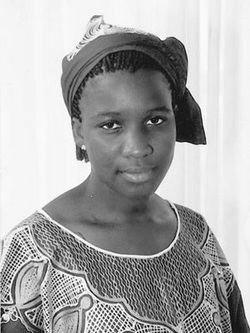
Some Cultural Factors for Nondisclosure of Child Sexual Abuse in Ghana
It is reported that only one in three women and girls in Ghana disclose their experiences of sexual abuse to a third party (Coker-Appiah and Cusack 1999). It is therefore reasonable to suggest that incidence of child sexual abuse in Ghana may be underestimated due to under reporting and nondisclosure of cases to law enforcement agencies.
 Juliana Dogbadzi, ex-trokosi slave. For her work to free trokosi slaves, she received Reebok Human Rights Award in 1999.[/caption]
Juliana Dogbadzi, ex-trokosi slave. For her work to free trokosi slaves, she received Reebok Human Rights Award in 1999.[/caption]
[caption id="attachment_483" align="alignleft" width="250"]
 Juliana Dogbadzi, ex-trokosi slave. For her work to free trokosi slaves, she received Reebok Human Rights Award in 1999.[/caption]
Juliana Dogbadzi, ex-trokosi slave. For her work to free trokosi slaves, she received Reebok Human Rights Award in 1999.[/caption]
Some traditional cultural beliefs about how women and children should be treated influence inequality and sexual violence against children and minors in Ghanaian society. Boakye (2009) identified some cultural factors that may be relevant to the phenomenon of nondisclosure or underreporting of child sexual abuse by victims and their families in Ghana. The identified cultural factors are:
Patriarchal nature of the society promotes male dominance and unequal social relations. Power becomes a means to deny abuse and to blame victims. The core element of patriarchal entitlement is the assumption that men have the right to take sexual advantage of women and children. Men use their power to oppress and threaten victims never to disclose the incident of child sexual abuse.
Child rape myth acceptance or false beliefs about child sexual abuse normalize sexual and blame the victim. There are misconceptions and myths that men are unable to control their sexual drives, and women and girls are expected to behave themselves in ways that avoid arousing desires of men. In addition, the fear that a girl who is sexually abused, has less chances of contracting a partner for marriage leads to the abuse kept secret.
The collective shame problem also accounts for the tolerance of sexual abuse and non-reporting in favor of the common family interest. The focus is on protecting and preserving the broader interest of the family. The preservation of family name and reputation is of more importance than the pain or trauma of the victim. A parent will rather not disclose the abuse in order to protect the victim’s future interest and to prevent family shame or the honor of the family being hit.
Other cultural and traditional practices contribute to the vulnerability of children to sexual abuse particularly girls. For instance, a traditional “juju” (magician or healer) may prescribe sex with a young virgin girl to a client to improve his business or lucky charm. Also, there is a practice in Ghana, called “trokosi” (slave of the gods) which is based on religious tradition and patriarchal superstition. It is practice not only in Ghana but also in Togo, Benin and Southwestern Nigeria (Aird Sarah 2007). According to this practice, when family member commits a crime such as theft, rape, murder, incest, the family must offer a virgin daughter between the age of twelve and fifteen to a local shrine where she will become a “trokosi” for retribution so that the gods will not bring vengeance upon the family. People living in small towns and villages prefer these traditional remedies for crime and thereby avoid the State legal system hence many abuses are never accounted for in national statistics on sexual abuse cases.
Sr. Rejoice Hoedoafia

